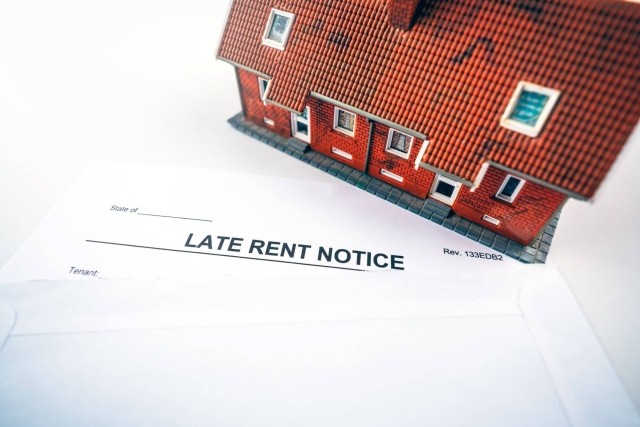As a landlord or property manager, you may find yourself charging tenants late rent fees at one point or another. But what are late rent fees? If your tenant does not pay rent on time, it is standard to charge them a fee for their late payment. Typically, landlords include a grace period in the lease agreement. Grace periods usually fall between three to five days after the rent due date each month. During this period, tenants can pay their rent to the landlord or property manager without facing any consequences. After the grace period, landlords may charge the tenant a fee for their late rent payment.
Should Landlords Charge a Late Fee?
Charging tenants a late fee is an excellent incentive for paying rent on time. After all, you need to pay your bills as well, and if their rent payments are late, then you’re on the losing end of this scenario. But if you charge a late fee, it would be wise to give tenants a grace period (especially if your local laws require it).
It’s essential to be both firm and lenient with tenants, so although you will charge them if they do not pay rent by a certain date, you are giving them a few days (specified in the lease) to make the payment. Several obstacles could affect rent payments coming in on time, especially if due on the first of the month, so giving a little leeway is a good idea.
If you decide not to charge your tenants late fees, they may start to slip and turn late payments into a more-than-once occurrence. Although it’s reasonable to let late payments slide the first time, you don’t want to be taken advantage of or risk your tenant falling behind and getting in the habit of partial or late payments.
There must be clear boundaries regarding you, your tenant, and rent payments. Remember that late fees are only legal if you include them in your lease agreement, if and the amount charged falls within the guidelines of your local laws.
How to Calculate a Late Rent Fee
As a landlord, you should always try to make things fair, especially regarding how much you charge for rent and fees. A standard late fee for rent is around five percent or less of the cost of the rent. If you charge $1,000 monthly for rent, you should charge $50 or less for a late fee.
Although this is standard, it’s essential to check if your state laws limit how much you can charge for late rent. After doing so, present the cost of the late fee, as well as the date rent is due, in the lease. Also include the last date tenants can pay the rent without incurring a late fee. If rent is due on the first of every month, and you’ve allowed a three-day grace period, then rent must be paid by the fourth of the month to avoid a late rent fee.
The Best Way to Collect Rent Is Here
Apartments.com offers hassle-free online rent collection for landlords. Collect rent payments and security deposits safely and securely on our platform. Your renters can set up automated payments to ensure you get the rent on time, every time. We put an end to those awkward conversations by automating late fees and emails to notify renters about upcoming or late rent payments. And, unlike our competitors, who restrict you to one renter per property, forcing you and your tenants to figure out payments on your own, Apartments.com allows for multiple roommates to be on your lease. This way, your tenants can easily see who has scheduled or sent a payment, so everyone stays up to date on who’s paid what. That said, their payment information is kept hidden from their roommates to ensure everyone’s privacy and security.
Law Fees by State
|
Alabama |
There are no formal laws regarding late fees in Alabama. However, if a lease does not list when or how much a landlord may charge for late fees, the landlord cannot charge a late fee. |
|
Alaska |
Per Alaska statute, rent is due on the date listed in the lease. However, landlords can only enforce an automatic late fee if the tenant agrees to it in the lease. |
|
Arizona |
Landlords can issue a late fee if the details about the late fee are in the lease. The details must include when the landlord may charge the late fee and for what amount. |
|
Arkansas |
Landlords must list any penalties for late payment in the lease agreement. Landlords cannot apply a late fee if the lease does not list late penalties. |
|
California |
|
|
Colorado |
Landlords must include details about late fees in the lease agreement in order to enforce them. |
|
Connecticut |
|
|
Delaware |
Landlords must allow a five-day grace period for late rent. Also, late fees cannot exceed five percent of the monthly rent amount. |
|
District of Columbia (Washington DC) |
Landlords must include details about late fees in the lease agreement in order to enforce them. Also, late fees cannot exceed five percent of the monthly rent amount. |
|
Florida |
Landlords must include details about late fees in the lease agreement in order to enforce them. Also, landlords must allow a three-day grace period for late rent. |
|
Georgia |
Landlords must include details about late fees in the lease agreement in order to enforce them. Late fees must able be “reasonable” according to court standards. |
|
Hawaii |
Landlords must include details about late fees in the lease agreement in order to enforce them. Also, landlords must allow a five-day grace period before proceeding with eviction. |
|
Idaho |
Landlords must include details about late fees in the lease agreement in order to enforce them. If a tenant’s check bounces, landlords must allow a fifteen-day grace period before charging a late fee. |
|
Illinois |
|
|
Indiana |
There are no formal laws regarding late fees in Indiana. However, landlords must include details about late fees in the lease agreement in order to enforce them. |
|
Iowa |
For rent $700 and below, late fees cannot exceed $12 per day or $60 per month. For rent $700 and above, late fees cannot exceed $20 per day or $100 per month. |
|
Kansas |
Landlords must include details about late fees in the lease agreement in order to enforce them. Late fees must be “reasonable” by court standards. |
|
Kentucky |
Landlords must include details about late fees in the lease agreement in order to enforce them. |
|
Louisiana |
There are no formal laws regarding late fees in Louisiana. |
|
Maine |
|
|
Maryland |
|
|
Massachusetts |
|
|
Michigan |
There are no formal laws regarding late fees in Michigan. However, landlords must include details about late fees in the lease agreement in order to enforce them. |
|
Minnesota |
|
|
Mississippi |
There are no formal laws regarding late fees in Mississippi. However, landlords must include details about late fees in the lease agreement in order to enforce them. Late fees must also be “reasonable”. |
|
Missouri |
There are no formal limits regarding the late fees landlords can charge. However, landlords must include details about late fees in the lease agreement in order to enforce them. |
|
Montana |
There are no formal limits regarding the late fees landlords can charge. However, landlords must include details about late fees in the lease agreement in order to enforce them. |
|
Nebraska |
Landlords must include details about late fees in the lease agreement in order to enforce them. |
|
Nevada |
|
|
New Hampshire |
Landlords must include details about late fees in the lease agreement in order to enforce them. |
|
New Jersey |
|
|
New Mexico |
|
|
New York |
|
|
North Carolina |
|
|
North Dakota |
There are no formal laws regarding late fees in North Dakota. However, landlords must include details about late fees in the lease agreement in order to enforce them. |
|
Ohio |
|
|
Oklahoma |
Landlords must include details about late fees in the lease agreement in order to enforce them. Late fees must be “reasonable” by court standards. |
|
Oregon |
|
|
Pennsylvania |
|
|
Rhode Island |
|
|
South Carolina |
There are no formal laws regarding late fees in South Carolina. However, landlords must include details about late fees in the lease agreement in order to enforce them. |
|
South Dakota |
Landlords must include details about late fees in the lease agreement in order to enforce them. Late fees must be “reasonable” by court standards. |
|
Tennessee |
|
|
Texas |
|
|
Utah |
There are no formal laws limiting late fees in Utah. However, landlords must include details about late fees in the lease agreement in order to enforce them. Also, late fees must be “reasonable” by court standards. |
|
Vermont |
|
|
Virginia |
Landlords must include details about late fees in the lease agreement in order to enforce them. |
|
Washington |
Landlords must include details about late fees in the lease agreement in order to enforce them. |
|
West Virginia |
Landlords must include details about late fees in the lease agreement in order to enforce them. |
|
Wisconsin |
|
|
Wyoming |
Landlords must include details about late fees in the lease agreement in order to enforce them. |
How to Enforce a Late Rent Fee
When enforcing the late fee, you’ll need to consider the cost, the date you’ll charge it, and your state’s laws. Renters may have hard feelings towards their landlord about the charge, potentially even refusing to pay the late fee. It’s essential to handle this situation professionally, calmly, and reasonably. Long-term tenants can benefit you in the long run, so keep the landlord-tenant relationship in a good place.
Include a late fee policy in the lease
If your lease does not include details on late fee amounts or when a landlord can charge a tenant, you will not have a leg to stand on as the landlord. Your lease must always include late fee policies. This way, your tenant can read it before they sign the lease. Once they sign, they can keep a copy of the lease and refer to your policy afterwards.
Remind your tenant
Your tenant may have forgotten to pay rent or the late fee, so approach them with a friendly reminder. Simply provide your tenant with a written notice to remind them how much their rent is, how much the late fee is, and how to pay them both.
Withhold late fees from the security deposit
If a tenant moves out with rent or fees unpaid, it’s common for landlords to withhold those funds from the security deposit. But before you do so, check with your local laws. If you’re unwilling to let this late rent payment slide (especially if it’s gone unpaid more than once), this is your next best option. You will need to provide your tenant with written notice as to why you’ve withheld money from their security deposit, including the amount, what it covers, and the date that they should’ve paid each payment. If there is damage to the property, also include repair cost in the written notice.
If the late fees exceed the security deposit amount, you can take more severe measures such as going to small claims court or evicting your tenant. Remember that both options require time, money, and effort, so it’s in your best interest to fix things with your tenant before it comes to this.
Remember that many extenuating circumstances could prevent a tenant from paying rent on time, such as losing their job or being unable to work due to illness or injury. While a tenant must pay rent fully and on time, it’s important to show empathy towards your renters, especially during difficult times. If you find yourself in this situation with your tenant, try using solutions such as cash for keys before you begin the eviction process or take other serious measures.
Tips for Encouraging Tenants to Pay on Time
Although some renters may default on payments, refuse to pay late fees, and leave your property with damage beyond normal wear and tear, it’s common for renters to simply forget to pay rent. It happens, so it’s important to be understanding with your tenants, first and foremost. But there are several ways to help you and your tenants avoid late rent payments.
Set up online rent payments
Although you can still allow tenants to pay rent by check, it’s great to have options, especially if that includes setting up online rent payments. If you list your rental property on Apartments.com, your tenants can sign up for recurring rent payments online with Rental Tools, so you can both rest easy knowing rent will be paid on time, every time.
Screen your tenants
The first step to a successful landlord-tenant relationship begins with adequately screening your tenants. By running a background check and checking their credit, employment, and rental history (a perk of screening tenants through Apartments.com Rental Tools), you’ll better understand what kind of person and tenant they will be.
As a part of the application process, you will request proof of income through bank statements, pay stubs, or even a new job offer letter. Knowing that the applicant meets your requirements to rent (the standard being they make at least three times the rent) and having insight on if they have paid rent on time in the past or dealt with any evictions will give you peace of mind that you are selecting the right tenant. In doing so, you will hopefully avoid any late rent payments in the future.
More often than not, renters will pay rent on time and leave your property in good condition. Even so, to protect you and your property, remember to screen your tenants properly, calculate and include a reasonable late fee in your lease, and keep a positive, professional relationship with your tenants.
Frequently Asked Questions
Should landlords consider a grace period before charging a late fee?
While most states do not explicitly require grace periods, landlords should consider extending them to tenants. Unforeseen circumstances occur, and when they do, grace periods allow tenants time to submit their rent payments without worry. While most grace periods range from three to five days, you can speak with your tenant to arrange a different period that works for you.
Should landlords be open to negotiating late fees?
Landlords should always include information on late fees in the lease agreement. This way, when tenants sign a lease, they effectively agree to the terms. Thus, landlords should not negotiate late fees after a tenant agrees to the terms of the lease.











